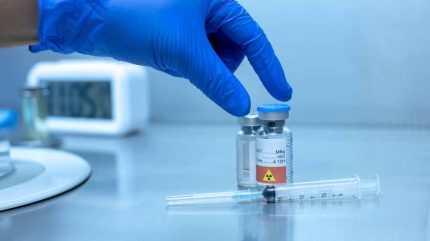
HPAPIs offer crucial advantages in treatments for serious and complex diseases, such as cancer and autoimmune disorders. Designed to target specific molecular pathways, HPAPIs can treat the disease with lower doses due to their high potency.
The market for HPAPIs is growing due to the increasing prevalence of complex diseases and the development of targeted therapies. GlobalData estimates suggest that HPAPIs may now account for more than 30% of the drug development pipeline. Further research by GlobalData (Contract Small Molecule API Manufacturing Industry by the Numbers) reveals a surge in demand for containment facilities in the small molecule API manufacturing industry, with top CMO/ CDMOs (contract manufacturing organisations) increasing their ownership of containment facilities.
Due to their toxicity, HPAPIs must be produced in high containment facilities that protect operators from exposure and prevent cross-contamination with other products. Manufacturing and handling these substances require compliance with strict guidelines and regulations to ensure product quality, safety, and efficacy.
The conditions in most need of treatments from HPAPI drugs
Recent developments in targeted therapies and personalised medicine have expanded the application of HPAPIs to treat a wide range of diseases and conditions requiring precise and potent treatments.
Some of the conditions that use HPAPIs include:
• Cancers. HPAPIs are extensively used in the development of oncology drugs. These drugs target specific molecular pathways involved in cancer growth and progression, enabling more effective and targeted treatment. Examples include chemotherapy drugs, targeted therapies, and immunotherapies
• Autoimmune disorders. HPAPIs help modulate the immune response and reduce inflammation. Examples include molecules used for rheumatoid arthritis, psoriasis, and multiple sclerosis
• Infectious diseases such as HIV/AIDS and hepatitis require potent antiviral medications. Potent molecules specifically designed may target viruses and inhibit their replication
• Rare diseases often have complex underlying mechanisms and require highly targeted therapies. Specific HPAPIs can be used to address selected molecular defects associated with these conditions
What are the main challenges with HPAPI production?
Even in small doses, HPAPIs are toxic and can pose serious risks to human health. Therefore, production and handling require facilities specifically designed to ensure the safety of operators and prevent cross-contamination with other drugs. To meet these demands, specialised equipment and facilities are needed, usually provided by CMOs.
However, it can be challenging to achieve consistent results that are also reproducible due to a lack of standardisation in solutions and equipment.
If not monitored closely, HPAPI manufacturing can lead to the leaching of substances into the environment. However, the prevention of leaching can be achieved with a heavy environmental footprint. There are further environmental impacts from HPAPI production due to the amount of energy used and waste generated
This comes as the pharma industry faces increasing scrutiny in achieving environmentally sustainable manufacturing practices and the need to identify a drug’s environmental impacts early in its lifecycle. Life Cycle Assessments (LCA) could help improve the environmental footprint of pharma manufacturing if more widely adopted.
How Indena’s facilities offer solutions for HPAPI manufacturing
With the increasing development of HPAPI-based treatments, such as chemotherapies, it is critical to establish a consistent and high-quality supply from a specialist manufacturer.
Indena has a century of experience in developing and producing high-quality ingredients for the pharma industry, as well as a long history in process research and development. Indena uses advanced equipment and expertise to produce both natural molecules requiring semisynthetic stages and fully synthetic products, including HPAPIs with OEL as low as 1ng/m3.
Indena’s comprehensive HPAPI development and manufacturing capabilities, on scales from grams to hundreds of kilos built on 25 years of proven safe operations in developing and manufacturing HPAPIs.
The company currently manufactures 12 commercial HPAPIs, including fully synthetic, semi-synthetic and fermentation-derived molecules, following strict production line protocols according to the required handling and containment rules. This includes the handling and manufacturing of the highest potent products such as warheads and payloads for ADC.
These factors all position Indena to serve the payload-linkers markets for ADCs with the handling of HPAPI (OEL >1ng/m3) and chromatographic purification (including prep. HPLC). In addition, Indena offers lyophilization for production of clinical phase batches, with options to scale up to commercial supply.
When working with toxic ingredients, looking after operators and scientists is paramount, and an essential part of efficient partner collaboration. Consistently investing in the highest quality equipment to handle HPAPIs, Indena’s CDMO has recently enhanced its R&D capabilities by implementing a state-of-art laboratory, including 12 fume hoods, two walk-in fume hoods, one laminar flow fume hood, and two glove boxes for a team of scientists. In addition, Indena has a global R&D capacity of 70 scientists.
Looking after the environment is also a key consideration for Indena. The company uses renewables at its facilities with much of its energy produced by on-site solar panels. Indena’s European factories are all ISO 14001-certified (Environmental Management System) and compliant with ISO 45001 (Occupational Health and Safety Management System).
All these factors not only help to ensure a reliable supply of vital medical products, enabling more patients to benefit, but are also better for the environment.
To learn more about how Indena can help with your CMO/CDMO needs on a sustainable level, download the document below.


